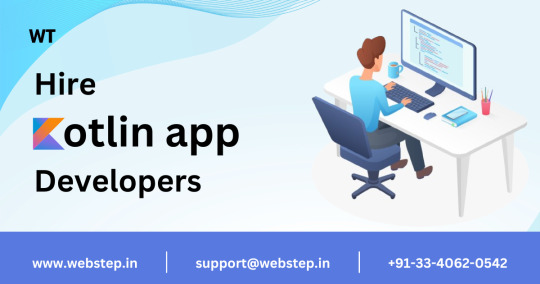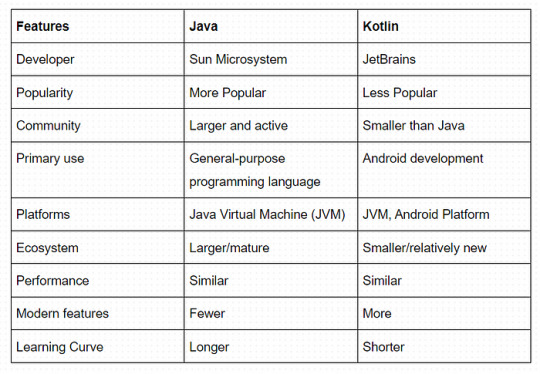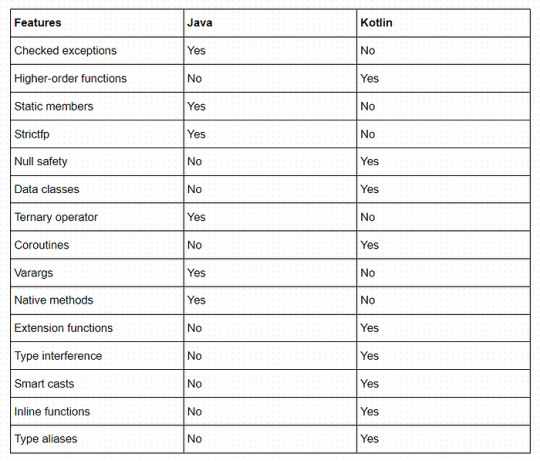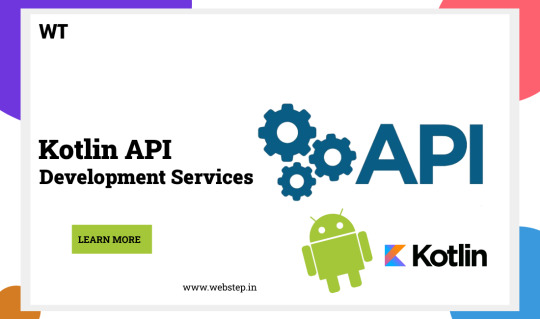#kotlin app development
Explore tagged Tumblr posts
Text
Fun with Flutter & Kotlin: A Beginner's Guide
Embark on the dynamic journey of cross-platform app development with the seamless integration of Flutter and Kotlin. This guide unveils key aspects for beginners, ensuring a smooth introduction to creating your first Flutter + Kotlin app.
Introduction
Discover the perfect synergy between Flutter, Google's UI toolkit, and Kotlin, a modern programming language, setting the stage for efficient cross-platform development.
Understanding Flutter
What is Flutter?: A Dart-powered framework simplifying cross-platform development.
Key Features: Real-time updates with Hot Reload and a rich widget library for intuitive UI development.
Setting Up Flutter: A user-friendly guide for installing Flutter SDK and configuring the development environment.
Dive into Kotlin
Introduction: Exploring Kotlin's origins, its role in mobile development, and interoperability with Java.
Setting Up Kotlin for Flutter: Seamless integration guidance for a harmonious development experience.
Building Your First Flutter + Kotlin App
Project Structure Overview: Breakdown of components and files within a Flutter + Kotlin project.
Creating UI with Flutter: Leveraging the widget system for visually appealing interfaces.
Adding Functionality with Kotlin: Integrating Kotlin code seamlessly for enhanced functionality.
Navigating Through Flutter and Kotlin
Navigation Basics: Demystifying navigation within a Flutter app.
Kotlin's Role in Navigation: Enhancing navigation functionalities with Kotlin code.
Debugging and Testing
Debugging Techniques in Flutter: Navigating common challenges with Flutter DevTools.
Testing Strategies with Kotlin: Effective unit testing guidance in Kotlin.
Optimization and Performance
Flutter Performance Tips: Managing widget rebuilds and optimizing state management.
Kotlin's Performance Contribution: Enhancing app performance through efficient coding and memory management.
Advanced Concepts
State Management in Flutter: Insights into advanced options for efficient state management.
Advanced Kotlin Features: Exploration of Kotlin's advanced features, including coroutines and concurrency.
Deployment and Publishing
Preparing Your App: Steps for building and securing an app for deployment.
Publishing on App Stores: Navigating submission processes for Google Play and App Store.
Troubleshooting and Common Issues
Flutter Troubleshooting: Strategies for addressing common issues and handling errors.
Kotlin-Specific Challenges: Identifying and overcoming challenges specific to Kotlin in Flutter projects.
Community and Resources
Joining Flutter Communities: Encouragement to connect through online forums and groups.
Kotlin Resources for Beginners: A curated list of tutorials and documentation for Kotlin learners.
This is the short description for flutter and kotlin. Check out the full descriptive blog for flutter vs Kotlin.
Conclusion
Summarizing key learnings, this guide encourages continued exploration of Flutter and Kotlin's potential in cross-platform app development. If you are a business owner and want your app ready but you are still not sure about which platform you should go for either flutter or kotlin. Here at Eitbiz you will find the best experts who will guide you to the best platform according to your business or service. Check out how we create and help businesses with our flutter app development and kotlin app development.
2 notes
·
View notes
Text
Top 10 Kotlin 2.0 Plugins to Boost Android Development

Kotlin 2.0 has revolutionized the world of Android development with its concise syntax, modern features, and seamless interoperability with Java. As the preferred language for Android app development, Kotlin has made coding more efficient and enjoyable.
One of the most significant advancements in Kotlin 2.0 is the extensive support for plugins that can dramatically enhance the development process.
In this article, we'll explore the top 10 Kotlin 2.0 plugins that every Android developer should consider integrating into their projects to boost productivity, improve code quality, and streamline workflows.
Why Use Kotlin 2.0 Plugins for Android Development?
Benefits of Kotlin 2.0 in Android Development
Kotlin 2.0 brings several benefits to Android development, including:
Concise Code: Kotlin reduces boilerplate code, making the codebase more readable and maintainable.
Null Safety: Built-in null safety features help prevent NullPointerExceptions, a common issue in Java.
Interoperability: Kotlin is fully interoperable with Java, allowing developers to use existing Java libraries and frameworks seamlessly.
Coroutines: Support for coroutines simplifies asynchronous programming, making it easier to write non-blocking code.
How Plugins Enhance Kotlin's Capabilities
Plugins are essential tools that extend Kotlin's functionality, providing developers with powerful features and utilities to streamline their development process.
They can automate repetitive tasks, enforce coding standards, and offer advanced capabilities that are not available out of the box. By integrating the right plugins, developers can significantly enhance their productivity and create robust, high-quality Android applications.
Top 10 Kotlin 2.0 Plugins to Boost Your Android Development
1. Kotlin Android Extensions
Overview
Kotlin Android Extensions is a plugin that simplifies view binding in Android development by eliminating the need for findViewById() calls.
Key Features
Automatic view binding
Support for Parcelable implementations
Reduces boilerplate code
How It Helps in Android Development
This plugin enhances productivity by reducing the amount of code needed to interact with UI elements, making the development process more efficient.
2. Kotlin KTX
Overview
Kotlin KTX is a set of Kotlin extensions designed to make Android development more concise and idiomatic.
Key Features
Extension functions for Android APIs
Simplifies common tasks
Enhances readability and maintainability
How It Helps in Android Development
By providing concise and expressive APIs, Kotlin KTX helps developers write cleaner and more maintainable code, speeding up development time.
3. Detekt
Overview
Detekt is a static code analysis tool for Kotlin that helps developers maintain code quality by detecting code smells, complexity, and style issues.
Key Features
Customizable rule sets
Supports plugins for additional checks
Integrates with CI/CD pipelines
How It Helps in Android Development
Detekt ensures code quality and consistency, making it easier to maintain and scale large codebases.
4. Koin
Overview
Koin is a lightweight dependency injection framework for Kotlin.
Key Features
Simple and easy-to-use DSL
No reflection, fast startup
Supports Android architecture components
How It Helps in Android Development
Koin simplifies dependency management, making the codebase more modular and testable.
5. SQLDelight
Overview
SQLDelight generates typesafe Kotlin APIs from SQL statements.
Key Features
Full SQLite support
Type-safe queries
Integrates with coroutines
How It Helps in Android Development
SQLDelight provides a robust and efficient way to work with databases, ensuring type safety and reducing runtime errors.
6. Moshi
Overview
Moshi is a modern JSON library for Android and Java.
Key Features
Converts JSON to Kotlin data classes
Supports Kotlin's nullable and default parameters
Lightweight and efficient
How It Helps in Android Development
Moshi simplifies JSON parsing, making it easier to handle API responses and data serialization.
7. MockK
Overview
MockK is a mocking library for Kotlin.
Key Features
Full support for Kotlin features
DSL for creating mocks
Support for coroutines and relaxed mocks
How It Helps in Android Development
MockK facilitates unit testing by providing powerful and flexible mocking capabilities.
8. Kotlinx.Serialization
Overview
Kotlinx.Serialization is a Kotlin library for JSON serialization.
Key Features
Multiplatform support
Supports JSON, CBOR, Protobuf
Annotation-based serialization
How It Helps in Android Development
Kotlinx.Serialization provides a straightforward way to serialize and deserialize data, supporting various formats and reducing boilerplate code.
9. Spek
Overview
Spek is a specification framework for Kotlin.
Key Features
Supports behavior-driven development (BDD)
Integrates with JUnit and IntelliJ IDEA
DSL for writing specifications
How It Helps in Android Development
Spek encourages writing clear and maintainable tests, improving the overall quality of the application.
10. Retrofit
Overview
Retrofit is a type-safe HTTP client for Android and Java.
Key Features
Converts HTTP APIs into Kotlin interfaces
Supports coroutines and RxJava
Handles requests and responses efficiently
How It Helps in Android Development
Retrofit simplifies API communication, making it easier to manage network requests and handle responses in a structured way.
How to Integrate Kotlin 2.0 Plugins in Your Android Project
Step-by-Step Guide to Adding Plugins
Open your project in Android Studio.
Navigate to the build.gradle file (app level).
Add the necessary dependencies for the plugins.
Sync your project to download the dependencies.
Configure the plugins as needed in your project settings.
Best Practices for Plugin Integration
Keep dependencies updated to benefit from the latest features and bug fixes.
Use only necessary plugins to avoid bloat and maintain performance.
Regularly review and refactor your plugin configurations to ensure optimal usage.
Maximizing Your Android Development Efficiency with Kotlin 2.0 Plugins
Tips and Tricks
Leverage IDE support: Use IntelliJ IDEA or Android Studio to get the most out of Kotlin's features.
Automate repetitive tasks: Utilize plugins that can automate coding tasks and enforce standards.
Stay informed: Follow Kotlin and Android development communities to stay updated on the latest tools and best practices.
Common Pitfalls to Avoid
Overloading your project with plugins: Too many plugins can slow down your build times and complicate your setup.
Ignoring updates: Outdated plugins can cause compatibility issues and security vulnerabilities.
Neglecting documentation: Always refer to official documentation for proper setup and usage guidelines.
Conclusion
Incorporating Kotlin 2.0 plugins into your Android development workflow can significantly enhance your productivity, improve code quality, and streamline your development process.
The top 10 plugins discussed in this article offer a range of features that can help you build robust and efficient Android applications. Experiment with these plugins, integrate them into your projects, and experience the benefits they bring to your development journey.
Ready to Enhance Your Android Development?
By leveraging the power of these essential Kotlin 2.0 plugins, you can take your Android development to the next level. Hire best kotlin developers who are expert in these plugins that helps to boost the development cycle faster and surely resultant into the cost-effective solution.
0 notes
Text
Kotlin Web Development Services

In the ever-evolving landscape of web development, staying ahead requires harnessing cutting-edge technologies that offer efficiency, reliability, and scalability. Enter Kotlin, the language that is revolutionizing web development services with its concise syntax, interoperability, and robust features. As businesses strive for innovation and seamless user experiences, Kotlin web development services emerge as a beacon of possibility, empowering developers to create high-performing web applications with unparalleled ease.
Kotlin, often heralded as the modern-day solution for Java development, transcends its origins to become the go-to choice for web development projects. Its seamless integration with existing Java codebases, coupled with its enhanced readability and reduced boilerplate code, makes it an ideal candidate for crafting robust web solutions. Kotlin web development services leverage this powerful language to streamline the development process, enabling teams to build feature-rich web applications that exceed client expectations.
One of the most compelling aspects of Kotlin web development services is their versatility across a myriad of platforms. Whether it's backend development with frameworks like Spring Boot or frontend development using popular JavaScript frameworks like React, Kotlin seamlessly adapts to diverse environments, offering developers the flexibility to innovate without constraints. This versatility not only simplifies development workflows but also accelerates time-to-market, ensuring that businesses can deliver exceptional web experiences faster than ever before.
Furthermore, Kotlin's concise syntax and expressive language features empower developers to write clean, maintainable code that is easily comprehensible and extensible. By reducing verbosity and eliminating common pain points associated with traditional languages, Kotlin fosters a more collaborative development environment where teams can focus on solving complex problems rather than grappling with the intricacies of the language itself. This enhanced productivity translates into tangible benefits for businesses, allowing them to optimize resource utilization and drive innovation without compromising quality.
In the realm of backend development, Kotlin web development services shine bright, offering unparalleled performance, scalability, and reliability. With frameworks like Ktor and Spring Boot, developers can effortlessly build robust RESTful APIs, microservices, and web applications that scale seamlessly to meet evolving business demands. Kotlin's strong type system and null safety features mitigate common runtime errors, ensuring that applications are robust and resilient in the face of unexpected challenges.
Moreover, Kotlin's interoperability with existing Java libraries and frameworks provides developers with access to a vast ecosystem of tools and resources, empowering them to leverage existing investments while embracing the future of web development. Whether it's integrating with enterprise systems, harnessing the power of cloud services, or implementing cutting-edge technologies like machine learning and IoT, Kotlin web development services offer a pathway to innovation that is both pragmatic and forward-thinking.
On the frontend, Kotlin's synergy with JavaScript frameworks opens up a world of possibilities for crafting immersive, interactive user experiences. With libraries like Kotlin.js and frameworks like React, developers can leverage Kotlin's expressive language features to build dynamic web interfaces that are responsive, intuitive, and engaging. By unifying frontend and backend development under a single language ecosystem, Kotlin enables seamless communication and collaboration across the entire stack, empowering teams to deliver cohesive web experiences that resonate with users on every level.
In conclusion, Kotlin web development services represent the future of web development, empowering businesses to innovate, scale, and thrive in an increasingly digital world. By harnessing the power of Kotlin's concise syntax, interoperability, and robust features, developers can unlock new possibilities and redefine the boundaries of what's possible in web development. As businesses continue to embrace digital transformation, Kotlin stands poised to lead the charge, driving innovation and excellence in web development for years to come.
1 note
·
View note
Text

Create Android App with OdiTek Solutions today. We help you to create android apps efficiently at a much faster rate because of our library of app scripts.
#create android app#android app development company in india#kotlin development company in india#best kotlin development company in india#best kotlin development services#android kotlin development#android kotlin#kotlin app development#kotlin app development services#kotlin development
0 notes
Text

Connect with us to create future-oriented and attractive mobile apps using the Kotlin language. We have a team of skilled and experienced software developers that are well-versed in advanced technology and guarantee on-time delivery.
0 notes
Text
Best Kotlin app development company in Bangalore- Pattem Digital
Pattem Digital stands out as the premier Kotlin Android application development company in Bangalore. Renowned for excellence, they craft top-notch mobile apps, leveraging their expertise in Kotlin. The skilled team at Pattem Digital delivers tailored solutions, ensuring clients receive high-quality, innovative, and user-friendly Android applications. With a focus on cutting-edge development, they are the go-to choice for superior Kotlin-based Android app development in Bangalore.
0 notes
Text
Unlock the power of Kotlin in Android app development! Explore its seamless interoperability with Java, minimalistic coding, Google's preference, and more.
0 notes
Text
Java vs Kotlin

Java is an incredibly popular and versatile programming language that is used in web, mobile, and desktop application development. On the other hand, Kotlin is a newer, more advanced version of Java, and it has a bunch of modern features that Java doesn’t have. However, if you are used to Java, there are several things you can miss in Kotlin.
In this article, we will compare the syntax, features, performance, and cost associated with developing programs in both languages so you can understand which language is suitable for your project.
Introduction
Java is a versatile, mature, platform-independent, general-purpose programming language that has maintained its prominence for more than two decades. Kotlin is a newer programming language inspired by Java, with a handful of modern features that help developers write programs in a more concise way.
Both languages are used in the development of a variety of applications. However, there are some scenarios where you may prefer one over the other, which we will discuss in a later part of this article. For example, Kotlin has an upper in Android application development while Java is still dominating the server-side, web, and desktop applications.
In fact, Kotlin was developed to address some of the limitations in Java, which has contributed to its growing popularity. Since it is fully interoperable with Java (you can use existing Java libraries, APIs, frameworks, and code and even mix both in one project), it also adds to the functionalities of Java.
Considering these factors, the debate among developers has consistently revolved around Java vs Kotlin. While no programming language can definitively claim superiority, a particular language may prove more suitable once your specific requirements become clear.
Let’s explore some key factors that deserve your attention to help you make an informed decision.
Syntax: Java vs. Kotlin
Kotlin is like a concise poem, while Java is like a verbose essay.
Kotlin is designed to support both object-oriented and functional programming paradigms, which allows developers to write code that is both expressive and concise. Additionally, Kotlin offers a more concise syntax.
Here is a simple program to calculate the sum in Java and Kotlin that compares the conciseness of the two languages:
In Java
public class JavaProgram { public static void main(String[] args) { int sum = 0; for (int i = 0; i < 10; i++) { sum += i; } System.out.println("The sum is: " + sum); } }
In Kotlin
fun main() { var sum = 0 for (i in 0 until 10) { sum += i } println("The sum is: $sum") }
Both programs perform identical tasks, but it’s the Kotlin program that glides gracefully with a touch of readability. For example, in Kotlin’s for loop, it doesn’t just use the mundane “for" keyword and the mundane "i < 10" condition – it has "until" keyword, making the program more human readable.
In addition to this, there is a wealth of improvement Kotlin has to offer for Java developers, including a few of them, such as you don’t need to explicitly specify the data type, Kotlin’s function declaration is shorter, etc.
On the other hand, Java requires variables and expressions to be declared explicitly. Therefore, Java has a relatively verbose syntax, with many keywords and punctuation marks.
Kotlin is also a statically typed language, but it has a more concise syntax than Java. Kotlin uses type inference to automatically determine the types of variables and expressions, which can make code more readable and maintainable.
In terms of writing programs, Kotlin has the upper hand, and you can express the same functionality with less code in a concise way.
Comparison: Java vs. Kotlin

Features: Java vs. Kotlin
More specifically, Kotlin is a newer language with modern features compared to its counterpart, Java. They share many common features, but there are also several distinct features that developers often evaluate from their perspective.
Features such as Explicit nullability and Extension functions help developers write more reliable and maintainable codebases in Kotlin. On the other hand, Kotlin does not have the ternary operator, static members, checked exceptions, and protected features.

Checked exceptions: Java requires developers to handle checked exceptions explicitly. This helps to prevent errors.
Higher-order functions: These functions can take other functions as arguments or return functions as results. This can be useful for writing more concise and reusable code.
Static members: Static members are members of a class that can be accessed without creating an instance of the class. This can be useful for sharing code and data.
Strictfp: The Strictfp keyword can be used to declare a method as having strict floating-point semantics. This can be useful for some specific tasks, but it can also make code less efficient.
Data classes: Data classes are a simple way to create immutable data classes. This can be useful for writing more concise and efficient code.
Ternary operator: Ternary operator is a shorthand way to write conditional expressions. This can be useful for writing more concise code.
Coroutines: Coroutines are a lightweight way to write asynchronous code. This can be useful for writing more responsive and efficient code.
Varargs: Varargs is a feature that allows a method to accept a variable number of arguments. This can be useful for writing more concise and flexible code.
Native methods: Native methods are methods that are implemented in a native language, such as C or C++. This can be useful for writing code that is more efficient, or that needs to interact with native code.
Extension functions: Extension functions can be added to existing classes without having to modify the classes themselves. This can be useful for adding new functionality to existing classes without having to make breaking changes.
Type inference: Type inference is a feature that allows Kotlin to infer the types of variables and expressions. This can make code more concise and easier to read.
Smart casts: Smart casts are a feature that allows Kotlin to cast variables to their inferred types automatically, making code more concise and easier to read.
Inline functions: Inline functions are functions that are expanded inline at the point of use. This can improve performance, but it can also make code more difficult to read.
Type aliases: Type aliases are a way to create new names for existing types. This can be useful for making code more concise and readable.
Null safety: Among these features, Null safety is a great addition to Kotlin, which saves time for developers as developers don’t need to deal with null NullPointerException. They are a significant problem in Java projects.
Performance: Kotlin vs. Java
They both have similar performance, as they are compiled to bytecode and run on the JVM. Kotlin may have a slight advantage over Java in certain cases. However, Java code is typically compiled faster than Kotlin, especially when using reflection.
On the other hand, Kotlin may outperform Java for small and simple programs, as some benchmarks have shown that Kotlin has better performance than Java in these cases. Additionally, Kotlin’s unique features, such as null safety and immutable data structures, can also contribute to the performance of Kotlin programs.
NullPointerException can reduce the number of runtime exceptions, resulting in improved performance of the application.
In summary, choose Java if you need to develop large and complex applications, as it is a mature language with robust resources. Kotlin is a newer language, but it is taking over Java for small application development due to its concise syntax and modern features.
Community Support: Java vs. Kotlin
Java
Java has been around for a long time and has a massive community. This translates into a wealth of resources, libraries, frameworks, and essential tools for developers. You can find solutions to almost any issues that you may encounter.
Additionally, Java has a great ecosystem of tools and IDEs, like Eclipse and IntelliJ IDEA, backed by a robust community of contributors.
Kotlin
Kotlin is relatively new, but its community is growing rapidly. You will also find many libraries and several frameworks available for Kotlin development, and support is available from Google and other companies. Kotlin’s official website, along with online communities like Stack Overflow and GitHub, provides ample resources for learning and troubleshooting.
Read more: https://www.brilworks.com/blog/java-vs-kotlin/
0 notes
Text
Leading Kotlin Application Development Company for Innovative Solutions

Beyond coding expertise, there are other benefits to working with a specialised Kotlin application development business. They provide strategic insights and leverage the conciseness of Kotlin to accelerate development cycles without sacrificing quality. Furthermore, a specialised Kotlin development company keeps up with the most recent developments and trends in the Android environment, guaranteeing that your apps have the newest features and functionalities.
Working together with a Kotlin application development company is an efficient and innovative investment. Whether you want to create a brand-new Android app or convert an old one to Kotlin, an experienced development partner can help you easily manage the process's intricacies. You can fully realise the potential of Kotlin by leaving your project to a skilled Kotlin development company. This will guarantee a successful and seamless journey from conception to deployment.
0 notes
Text

Discover the leading mobile app development software in 2023 - Appy Pie, Zoho Creator, AppSheet, Appian, and Appery.io. Choose the best for your app creation needs!
#app development#mobile app development company#ios app development company usa#website development#website designing#react-native app development#kotlin app development#kotlin application developer us#kotlin app developer
0 notes
Text
#kotlin app development services#kotlin android app development#kotlin app development company#kotlin app development
0 notes
Text
#kotlin#hire kotlin developers#kotlin app developers#kotlin app development#mobile application development
0 notes
Text
Kotlin App Development Services, Android Developer
Welcome to our Kotlin App Development Company, where we specialize in delivering top-notch Kotlin App Development Services that cater to your specific business needs. Kotlin has emerged as a preferred language for Android app development due to its concise syntax and robust features, and we are experts in harnessing its capabilities. Our team of skilled Kotlin developers is passionate about crafting innovative and high-performance Android applications that stand out in the market. Whether you're launching a new app or looking to upgrade an existing one, we have the expertise to transform your ideas into reality. We are committed to providing clean, efficient, and user-friendly solutions, ensuring your Kotlin app not only meets your objectives but also exceeds user expectations.
0 notes
Text
Kotlin API development services

In the ever-evolving landscape of software development, Kotlin has emerged as a powerhouse, gaining popularity for its concise syntax, interoperability with Java, and seamless integration capabilities. As businesses seek to build robust and scalable applications, Kotlin API development services have become a focal point for developers. In this article, we'll explore the key aspects of Kotlin API development services and how they are reshaping the future of software architecture.
Why Choose Kotlin for API Development:
Kotlin, a statically typed programming language, brings a host of advantages to API development. Its succinct syntax reduces boilerplate code, making development more efficient and less error-prone. With full interoperability with Java, Kotlin allows developers to leverage existing Java libraries seamlessly, providing a smooth transition for projects migrating from Java to Kotlin.
Expressive and Concise Code:
Kotlin's expressiveness allows developers to write clean and concise code, enhancing readability and maintainability. This is particularly advantageous in API development, where simplicity and clarity are paramount. The reduced verbosity of Kotlin code not only accelerates the development process but also contributes to the overall quality of the API.
Enhanced Safety and Null Safety:
Kotlin is designed with a strong focus on null safety, addressing one of the most common sources of runtime errors. The language's type system helps eliminate the infamous null pointer exceptions, providing developers with a more secure environment for API development. This feature significantly contributes to the reliability and stability of Kotlin-built APIs.
Seamless Integration with Existing Java Codebase:
Kotlin's compatibility with Java extends beyond just syntax. This interoperability ensures a smooth integration process with existing Java codebases. Businesses can adopt Kotlin gradually, introducing it into their projects without the need for a complete overhaul. This flexibility makes Kotlin API development an attractive option for organizations with established Java infrastructure.
Coroutines for Asynchronous Programming:
Asynchronous programming is crucial in API development to handle concurrent tasks efficiently. Kotlin introduces coroutines, a powerful and lightweight concurrency design pattern, simplifying the complexity of asynchronous code. This feature allows developers to write asynchronous operations more naturally, leading to more responsive and scalable APIs.
Thriving Community Support:
Kotlin benefits from a vibrant and supportive community of developers. The community actively contributes to the language's growth, providing libraries, tools, and best practices for Kotlin API development. This support ensures that Kotlin stays aligned with industry standards and continues to evolve to meet the ever-changing demands of modern software development.
Conclusion:
In conclusion, Kotlin API development services offer a compelling solution for businesses seeking to build high-performance, scalable, and maintainable APIs. The language's concise syntax, enhanced safety features, seamless integration with Java, coroutines for asynchronous programming, and strong community support make Kotlin an ideal choice for forward-thinking developers and organizations. As we navigate the future of software architecture, embracing Kotlin API development services opens the door to innovation and sets the stage for a new era in application development.
#kotlin api development#kotlin app development#kotlin application#webstep#webstep technologies kolkata
1 note
·
View note